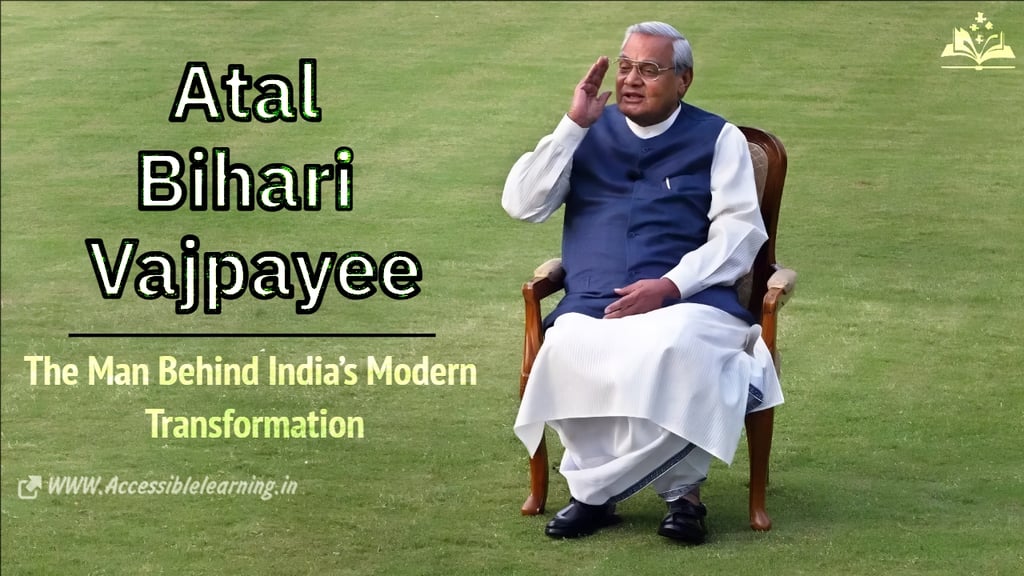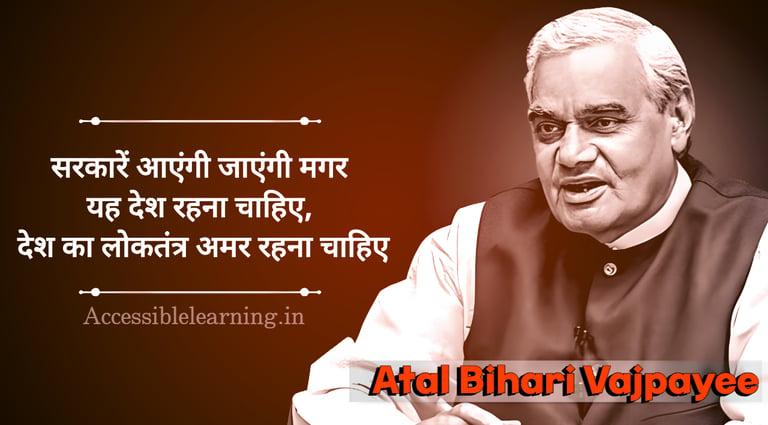
Atal Bihari Vajpayee: Architect of Peace, Progress, and Prosperity
Explore the life and legacy of Atal Bihari Vajpayee, India’s iconic statesman, poet, and visionary leader. This in-depth article covers his political journey, major achievements, leadership during critical events, and enduring contributions to India’s growth and democracy.
THE GREAT LEADERPOLITICAL JOURNEYBIOGRAPHY/HISTORYINDIA/BHARAT
Keshav Jha
1/24/20255 min read


Atal Bihari Vajpayee (अटल बिहारी वाजपेयी) Ji, one of India’s most revered leaders, left an indelible mark on the nation’s history as a statesman, poet, and visionary. Born on December 25, 1924, in Gwalior, Madhya Pradesh, Vajpayee rose to prominence as a distinguished leader of the Bharatiya Janata Party (BJP), eventually serving as the Prime Minister of India in three terms: first for 13 days in 1996, then for 13 months in 1998-1999, and finally from 1999 to 2004. His tenure is remembered for political stability, economic reforms, and a commitment to fostering peace and development.
Early Life and Education
Vajpayee was born into a middle-class Brahmin family. His father, Krishna Bihari Vajpayee, was a schoolteacher and a poet, and his mother, Krishna Devi, instilled values of discipline and humility. Vajpayee pursued his education at Victoria College (now Laxmi Bai College) in Gwalior, excelling in academics and graduating with distinction in Hindi, English, and Sanskrit. Later, he earned a Master’s degree in Political Science from Dayanand Anglo-Vedic (DAV) College in Kanpur.
From a young age, Vajpayee exhibited a keen interest in public speaking and literature, often participating in debates and writing poetry. These formative years shaped his worldview and laid the foundation for his illustrious political and literary career.
Entry into Politics
Atal Bihari Vajpayee’s political journey began during India’s freedom struggle. Influenced by leaders like Shyama Prasad Mukherjee (श्यामा प्रसाद मुखर्जी) and Deendayal Upadhyaya (दीनदयाल उपाध्याय), he joined the Rashtriya Swayamsevak Sangh (RSS) in 1947 and later became a founding member of the Bharatiya Jana Sangh (BJS) in 1951. Vajpayee’s oratory skills and political acumen made him a prominent figure in Indian politics. He was first elected to the Lok Sabha in 1957 from Balrampur in Uttar Pradesh.
During the Emergency imposed by Indira Gandhi in 1975–77, Vajpayee emerged as a vocal critic, championing the cause of democracy and civil liberties. His resilience and leadership during this period solidified his reputation as a steadfast leader.
A Visionary Leader and Prime Minister
Vajpayee’s leadership as Prime Minister was characterized by bold decisions and transformative policies. Here are some key highlights of his tenure:
Pokhran-II Nuclear Tests (1998)
One of Vajpayee’s most defining moments was leading India’s successful nuclear tests at Pokhran in May 1998. This decision showcased India’s technological and defense capabilities, asserting its position as a global power. Despite facing international sanctions, Vajpayee stood firm, emphasizing India’s right to self-defense.
These tests not only demonstrated India’s strategic strength but also fueled a sense of national pride and self-reliance, earning Vajpayee widespread admiration across political and social spectrums.
Economic Reforms and Infrastructure Development
Vajpayee’s tenure saw significant economic reforms that modernized India’s economy. His government focused on liberalization, reducing fiscal deficits, and promoting foreign investments. The landmark Golden Quadrilateral project, aimed at connecting India’s major cities with world-class highways, was a testament to his vision for robust infrastructure.
His administration also prioritized rural development through initiatives like the Pradhan Mantri Gram Sadak Yojana, which aimed to improve connectivity in remote areas. Additionally, Vajpayee’s tenure saw a surge in IT exports, positioning India as a global hub for information technology.
Kargil War (1999)
During the Kargil conflict with Pakistan, Vajpayee demonstrated exceptional leadership. His government’s diplomatic and military strategies ensured India’s victory while maintaining international support. His commitment to peace was evident even after the war, as he extended a hand of friendship to Pakistan through initiatives like the Lahore Declaration.
Vajpayee’s composure and determination during the conflict inspired confidence among citizens and armed forces, further cementing his legacy as a decisive leader.
Focus on Peace and Diplomacy
Vajpayee was a staunch advocate of peace. His historic bus journey to Lahore in 1999 symbolized his efforts to normalize relations with Pakistan. Despite setbacks, including the Kargil War and the 2001 Parliament attack, he remained committed to dialogue and diplomacy.
His vision for regional cooperation extended beyond Pakistan. Vajpayee played an instrumental role in strengthening India’s ties with the United States, Russia, and Southeast Asian nations, enhancing India’s global standing.
Social and Technological Advancements
Under Vajpayee’s leadership, India witnessed advancements in science and technology, particularly in the IT sector. Initiatives like the Sarva Shiksha Abhiyan aimed to improve education access, while telecom reforms laid the groundwork for India’s mobile revolution.
His government also introduced several welfare schemes, including the Antyodaya Anna Yojana, which aimed to provide subsidized food grains to the poorest sections of society, reflecting his commitment to inclusive development.
Vajpayee’s Role in Strengthening Democracy
As a parliamentarian, Vajpayee was a firm believer in democratic values. He often emphasized consensus-building and respected opposition voices, setting a high standard for parliamentary decorum. His speeches in Parliament were not only insightful but also laced with humor, showcasing his ability to connect with people across the political spectrum.
Reforms in Governance
Vajpayee introduced measures to improve governance, focusing on transparency and accountability. His administration encouraged public-private partnerships to boost infrastructure development and initiated e-governance programs to enhance the delivery of government services.


The Poet-Philosopher
Beyond politics, Vajpayee was an accomplished poet and writer. His works, such as "Meri Ekyaavan Kavitayein (मेरी एक्यवान कविताएँ)," reflect his deep philosophical insights and love for humanity. His eloquence and wit, both in Hindi and English, captivated audiences and earned him the reputation of being one of India’s finest orators.
His poetry often reflected his personal struggles, dreams for India, and his unyielding spirit. Lines like "Maut se than gahi (मौत से ठन गही)" ("I have squared off with death") showcase his resilience and philosophical depth.
Awards and Honors
Vajpayee’s contributions were widely recognized. In 2015, he was conferred India’s highest civilian honor, the Bharat Ratna. December 25, his birthday, is celebrated as Good Governance Day in his memory.
He also received the Padma Vibhushan in 1992 and the Lokmanya Tilak Award, among others, highlighting his multifaceted contributions to the nation.
Retirement and Legacy
Vajpayee retired from active politics in 2005 due to health issues but continued to inspire millions. He passed away on August 16, 2018, leaving behind a legacy of integrity, vision, and patriotism.
His Samadhi, "Sadaiv Atal," in New Delhi, serves as a memorial to his life and values, attracting visitors and leaders who wish to pay their respects to the iconic statesman.
Vajpayee’s Enduring Impact
Atal Bihari Vajpayee’s leadership style was marked by a rare blend of pragmatism and idealism. He believed in consensus-building, often reaching across party lines to ensure the smooth functioning of democratic institutions. His emphasis on inclusive growth, peace, and infrastructure development laid the groundwork for India’s transformation into a global power.
His speeches, policies, and poetry continue to resonate with people, serving as a reminder of the values of humility, perseverance, and service to the nation.
Atal Bihari Vajpayee (अटल बिहारी वाजपेयी) was more than a political leader; he was a statesman who envisioned an inclusive, progressive, and prosperous India. His unwavering commitment to democracy, economic reforms, and peace has left an enduring legacy. As India continues to grow on the global stage, Vajpayee’s contributions remain guiding lights for generations to come.
Subscribe to our newsletter
All © Copyright reserved by Accessible-Learning
| Terms & Conditions
Knowledge is power. Learn with Us. 📚


